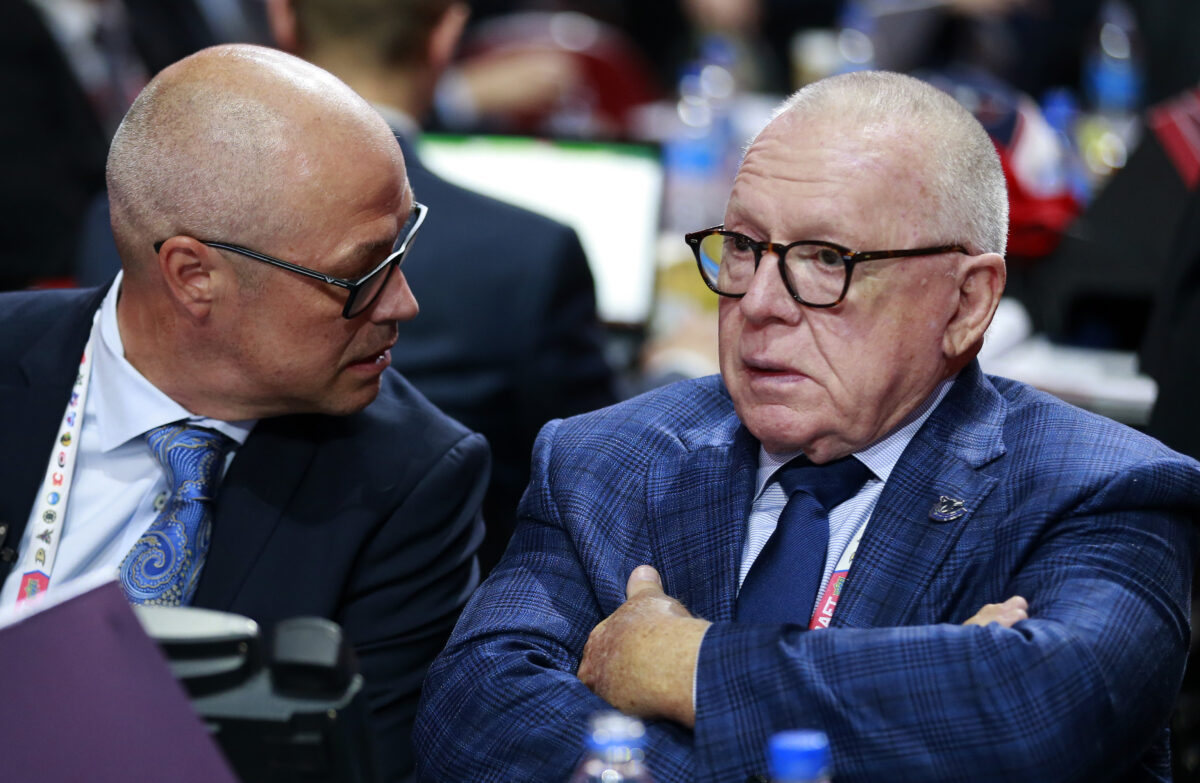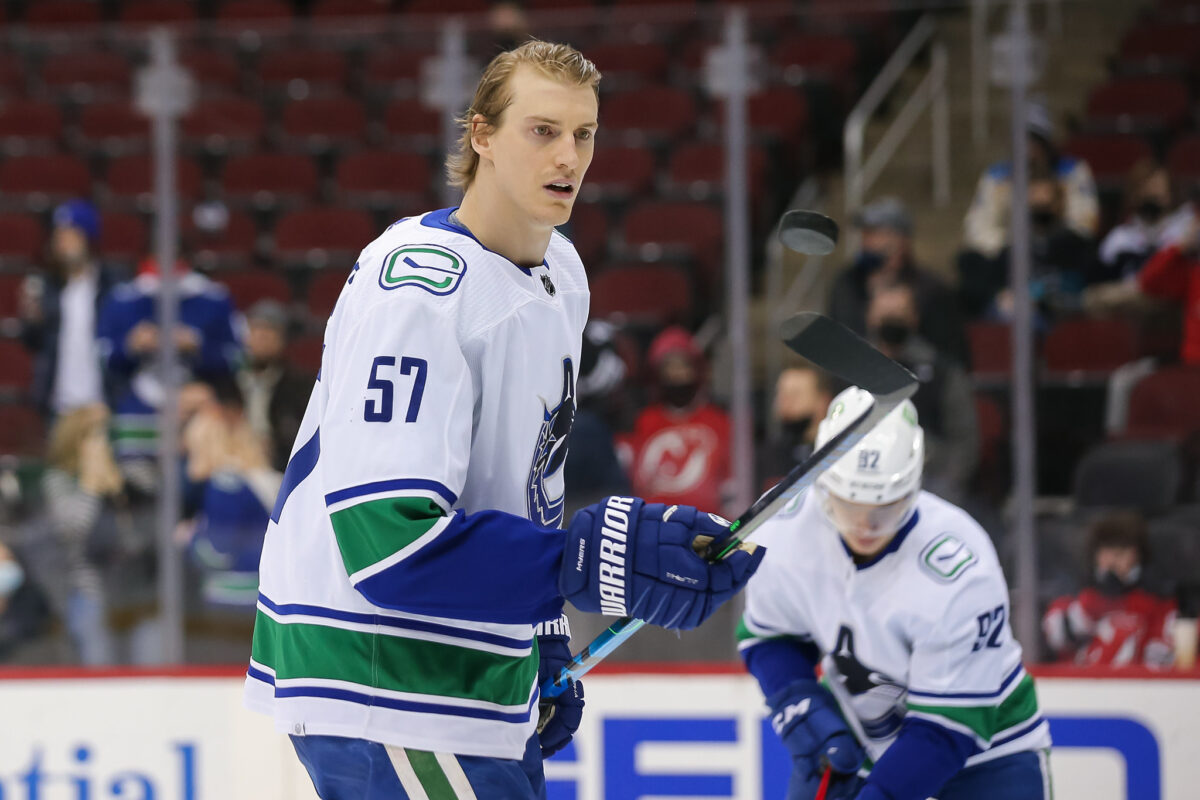Vancouver Canucks defenseman Tyler Myers has had an otherwise rough go after signing his monster five-year, $30 million contract in the summer of 2019. The deal raised eyebrows – as most of former general manager Jim Benning’s signings did – and even today, the contract is perplexing. However, he has the ability to rectify his shortcomings as he enters the final year of his deal.
Canucks’ & Myers’ Outlook on Upcoming Season
This season is crucial for the Canucks. General manager Patrik Allvin and president of hockey operations Jim Rutherford did an excellent job of bolstering the blue line and filling out the bottom-six with the additions of Teddy Blueger and Pius Suter in free agency this summer. Expectations are high for this group, and they should be (from “Drance: Why Canucks expectations for next season must extend beyond the playoffs,” The Athletic, Aug. 9, 2023).

The usual stars – Elias Pettersson, Quinn Hughes, J.T. Miller, Andrei Kuzmenko, etc. – should, on paper, continue to perform for the Canucks. The additions of Filip Hronek, Ian Cole and Carson Soucy give the team a formidable defensive group for the first time in a long time. But there are questions when it comes to the rest of the lineup, Myers included. If he can have his best season as a Canuck, how high will the team’s ceiling be?
What a Successful Season Looks Like from Myers
In his four seasons in Vancouver, Myers has amassed a poor -1.2 wins above replacement (WAR). Among all Canucks defensemen who played for the organization during Myers’ tenure, he has had the first, eighth, ninth, and 26th worst seasons when it comes to WAR. Last year was Myers’ worst in the blue and green. His -3.9 goals above expected (GAA) was fourth-worst among all defensemen, while his 41% Corsi for (CF%) was bottom-30 among his blue-line counterparts. His offence took a nosedive, as well, putting up just 17 points in 78 games.
Related: Canucks’ Blue Line Will Make or Break 2023-24 Season
However, let’s do away with the negativity and see what a successful season from Myers would look like. With the addition of Hronek, Vancouver has plenty of offensive firepower from the blue line, especially with Hughes in the mix. This bodes well for Myers, as he can now focus on using his 6-foot-8 frame to defend.
Too many times, Myers has jumped into the rush, turned the puck over, and conceded an odd-man rush. Analytics reflect that he was within the 24th percentile when it comes to even-strength offence, meaning 76% of NHL defensemen were better than him offensively (from JFresh’s paid Patreon subscription service). He used to be a capable offensive defenseman during his days as a Buffalo Sabre and Winnipeg Jet, but those days are long gone. By becoming more of a stay-at-home defenseman, he is more likely to produce.

Another aspect of Myers’ game that he must improve on is taking fewer penalties. Giveaways and penalties have always been his kryptonite, hence the “Chaos Giraffe” moniker that he’s been given. Because of his height, Myers has never been a graceful skater, and his skating has declined with age, which has led to more penalties as he struggles to keep up with speedy forwards.
The American-born Canadian finished in the 3rd percentile among defensemen last season, which meant 97% of defensemen took fewer penalties than he did (JFresh). Vancouver’s penalty kill was abysmal last season, so if Myers can stay out of the box, that will help the team. If he can reach the 25th percentile, that would be a win for him and the Canucks.
Myers’ Potential Impact on the Canucks
If Myers can fix these parts of his game, he could really elevate the group. By improving his defensive game and focusing less on being a playmaker, he would also be helping his goaltenders, Thatcher Demko and Artur Silovs. Demko, specifically, has had a heavy workload the past three seasons and is coming off a groin injury in 2022-23. He is an integral part of any future success for the team, so keeping him fresh and healthy will be critical.
As for Myers’ penalties, if he can cut those down, the team can use their forwards more at even strength to help the attack, scoring goals at a higher rate. Obviously, those issues won’t immediately propel Vancouver to the playoffs. Other players must perform as well, and the Canucks will need to avoid the injury bug at all cost. But with an improved version of the defenseman, the team’s chances of making the postseason – and, dare I say, make a run – will only go up.
His time as a Canuck is likely over after this season. He will turn 34 in February, and Rutherford and Allvin looked into trading the defenseman this offseason, signalling that he is no longer in the organization’s plans. Despite his tumultuous tenure in British Columbia, a strong final season would allow him to leave on a high note as the team looks to take a step forward.
Analytics Provided By: Natural Stat Trick, MoneyPuck, Evolving-Hockey
